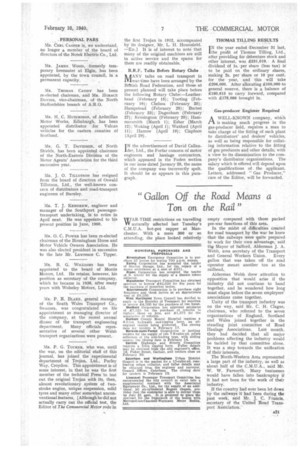"Gallon Off the Road Means a Ton on the Rail"
Page 23

If you've noticed an error in this article please click here to report it so we can fix it.
WAR TIME restrictions on travelling IT naturally affected last Tuesday's C.M.U.A. hot-pot supper at Manchester. With a mere 300 or so attending, the place looked relatively
empty compared with those packed pre-war functions of this area.
In the midst of difficulties created for road transport by the war he knew that the railways were quite prepared to work for their own advantage, said th4 Mayor of Salford, Alderman J. A. Webb, area secretary of the Transport and General Workers Union. Every gallon that was taken off the road operator meant another ton at the railhead.
Alderman Webb drew attention to opposition that would arise if the industry did not continue to band together, and he wondered how long must elapse before the seven employers' associations came together.
Unity of the transport industry was
on the way, said Mr. C. H. Clague, chairman, who referred to the seven organizations of England. Scotland and Wales joined together in the standing joint committee of Road Haulage Associations. Last month, they had decided that all major problems affecting the industry would be tackled by that committee alone. It was a step towards the unification• of their interests.
The North-Western Area represented a large part of the industry, as well as about half of the C.M.U.A., said Mr. W. W. Farnorth. Many businesses would have fallen into bankruptcy if it had not been for the work of their industry.
If the country had ever been let down by the railways it had been during the past week, said Mr. I. -C. Francis, secretary of the United Road Transport Association:




























































